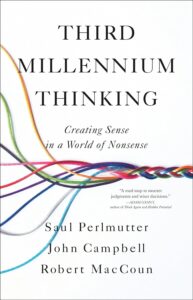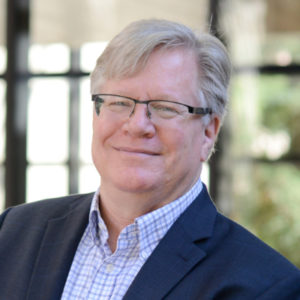Thinking Our Way Through the Third Millennium
A New Book Co-Authored by Stanford Law Professor Robert MacCoun Argues That We Need to Embrace Scientific Methods in Order to Advance “Third Millennium Thinking.”

Awash in a tsunami of often-conflicting information, people tend to look to experts for guidance on what to believe and what to do. If an expert comes across as highly confident and their opinion dovetails with one’s political views or confirms what one’s social circle tends to believe, then the opinion usually resonates as truthful and valuable.
But how do we really know if we are making fully informed decisions based on the entire picture? How do we determine who is truly an “expert?” And how do we even begin to cut through all the fake news and alternative facts?
According to the three co-authors of the forthcoming book, Third Millennium Thinking: Creating Sense in a World of Nonsense, we need to learn to think differently if we want to deftly navigate the age of information overload and cooperate to tackle pressing global problems.
In short, the authors argue, we need to think more like scientists.
Stanford Law School’s Robert MacCoun, a social scientist and the James and Patricia Kowal Professor of Law, spent five years writing Third Millennium Thinking with his former UC Berkeley colleagues Saul Perlmutter, a Nobel Prize-winning physicist, and philosophy professor John Campbell. Prior to MacCoun joining the SLS faculty in 2014, the trio conceived and co-taught a UC Berkeley undergraduate course they dubbed “Sense and Sensibility and Science.” The class, which remains highly popular at Berkeley, explores key aspects of scientific thinking and tackles the same big issues as their book: namely, the many ways we humans tend to fool ourselves and how to avoid them—including how to identify real expertise, evaluate causal claims, and avoid reasoning biases. Third Millennium Thinking will be released on March 26, 2024.

Drawing on the co-authors’ disparate areas of focus—philosophy, physics, and social psychology—Third Millennium Thinking uses a scholarly-but-accessible approach to nudge readers into the realm of science-inspired thinking. “It is not a self-help book,” MacCoun says, “and it is not intended to be a ‘how to,’ but we provide the ideas and the toolkit to help people become better decision makers.”
The authors’ toolkit is full of science-inspired mindsets and processes, from probabilistic thinking (which helps counter a black-or-white mindset) to learning how to filter information for “signal” while ignoring the “noise.” Ultimately, the book advocates “relentless self-questioning,” a state of mind that is baked into the scientific process, but which does not come easily to many people, regardless of educational level or political leaning.
“For most of us, a little self-questioning goes a long way,” says co-author Campbell, whose work at UC Berkeley focuses on the theory of meaning, metaphysics, and the philosophy of psychology. “We’re busy and engaged with our lives and, anyway, for most of us, however sharp we are at spotting other people’s biases, our own are very hard for us to detect. Many of the techniques described in the book are ways scientists have of eliminating those biases, in a quite impersonal way, that we can all readily use in everyday life.”
Lessons for Lawyers
There are important lessons and reminders in Third Millennium Thinking for those in the legal profession, MacCoun says, especially given the adversarial nature of the law.
“I often contrast the adversarial approach of the law with the inquisitorial approach of science,” says MacCoun, a former behavioral scientist at the RAND Corporation who has published numerous studies and books on drug legalization policies, among other “hot button” issues, as he says, at the intersection of the law, psychology, and public policy. “In my writing and research, I have worked hard to be an ‘honest broker,’ to inform the debate in a meaningful way, without coercion, but that’s often not what people want. They don’t want you to be an honest broker. They want you to take sides; they want you to be overconfident, which is exactly the opposite of the scientific approach. That’s partly because some of our problems are existentially terrifying and there’s something reassuring about having an authority figure tell you what to do.”
So how do we become Third Millennium Thinkers in the face of all these human impulses pushing us toward faulty decision-making, groupthink, blind confidence, and over-reliance on experts?
“We don’t say it is easy,” MacCoun says. But with a scientist’s toolkit and an understanding of where we tend to go off track, we can make inroads, he says. One of the most powerful tools, the authors write, is probabilistic thinking, which requires embracing uncertainty. “The practice of attaching a degree of uncertainty to every statement is a big source of science’s strength,” they write. “It helps you to not feel too attached to any particular belief you have at that moment. By not having your whole sense of self rest on your statements being right every time, you give yourself room to be a proud and competent scientist and yet be wrong some of the time when you say, ‘I’m fairly confident this theory captures what’s going on.’ ”
Co-author Perlmutter, who shared the 2011 Nobel Prize in Physics for the discovery of the accelerating expansion of the universe, says he hopes the book will help people to see “how easy it is to fool yourself” and why it is critical to seek out discussion with people who have different opinions. “Your first reason for meeting with them is not to convince them that you are right, but to get them to help you figure out where you might be wrong so that you can sharpen your understanding of the world and become much more effective in pursuing any important goal.”
MacCoun and his co-authors will speak about their book on March 28 at the Commonwealth Club in San Francisco. Learn more here.
